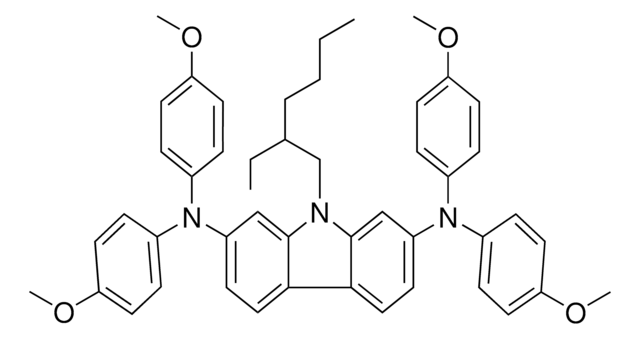913758
Phen-NaDPO
Synonym(s):
3-[6-(diphenylphosphinyl)-2-naphthalenyl]-1,10-Phenanthroline
Sign Into View Organizational & Contract Pricing
All Photos(2)
About This Item
Empirical Formula (Hill Notation):
C34H23N2OP
CAS Number:
Molecular Weight:
506.53
MDL number:
UNSPSC Code:
12352103
NACRES:
NA.23
Recommended Products
Assay
≥98%
Quality Level
form
powder
transition temp
Tg ~116 °C
solubility
soluble (Soluble in polar and weakly polar solvents such as isopropanol, toluene and xylenes)
semiconductor properties
(mobility=0.0001-0.001 cm2/V·s) (electron)
Application
Phen-NaDPO is a universal cathode modifier for organic optoelectronics. Phen-NaDPO can significantly lower the work function of the Ag metal as well as ITO and HOPG.
It lowers the energy loss between organic layer and the metal electrode, results in higher acheiveable efficiency for organic solar cells. It is also used as cathode interfacial material for inverted Perovskite solar cells, and electron transport materials for Perovskite solar cells and other organic electronic devices in general.
It lowers the energy loss between organic layer and the metal electrode, results in higher acheiveable efficiency for organic solar cells. It is also used as cathode interfacial material for inverted Perovskite solar cells, and electron transport materials for Perovskite solar cells and other organic electronic devices in general.
Storage Class Code
11 - Combustible Solids
WGK
WGK 3
Flash Point(F)
Not applicable
Flash Point(C)
Not applicable
Choose from one of the most recent versions:
Certificates of Analysis (COA)
Lot/Batch Number
Sorry, we don't have COAs for this product available online at this time.
If you need assistance, please contact Customer Support.
Already Own This Product?
Find documentation for the products that you have recently purchased in the Document Library.
Triarylphosphine Oxide as Cathode Interfacial Material for Inverted Perovskite Solar Cells.
Wang K, et al.
Advanced Materials Interfaces, 6(12) (2019)
Qiang Su et al.
Advanced science (Weinheim, Baden-Wurttemberg, Germany), 5(10), 1800549-1800549 (2018-10-26)
The phenomenon of positive aging, i.e., efficiency increased with time, is observed in quantum-dot light-emitting diodes (QLEDs). For example, the external quantum efficiency (EQE) of blue QLEDs is significantly improved from 4.93% to 12.97% after storage for 8 d. The
Improved quantum dot light-emitting diodes with a cathode interfacial layer.
Ding T, et al.
Organic Electronics, 32, 89-93 (2016)
Use of the Phen-NaDPO:Sn(SCN)2 Blend as Electron Transport Layer Results to Consistent Efficiency Improvements in Organic and Hybrid Perovskite Solar Cells.
Seitkhan A, et al.
Advances in Functional Materials, 29(49), 1905810-1905810 (2019)
Tuning of the conformation of asymmetric nonfullerene acceptors for efficient organic solar cells.
Yang L,et al.
Journal of Material Chemistry A, 7(39), 22279-22286 (2019)
Our team of scientists has experience in all areas of research including Life Science, Material Science, Chemical Synthesis, Chromatography, Analytical and many others.
Contact Technical Service![Spiro[9H-fluorene-9,9′-[9H]xanthene]-2,7-diamine](/deepweb/assets/sigmaaldrich/product/structures/307/234/46c07f0c-9242-4c0b-8994-8121690da3c9/640/46c07f0c-9242-4c0b-8994-8121690da3c9.png)







